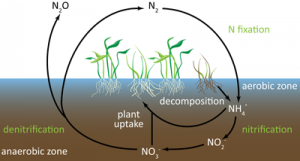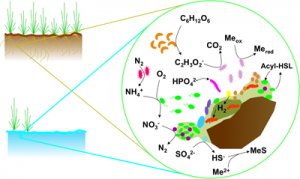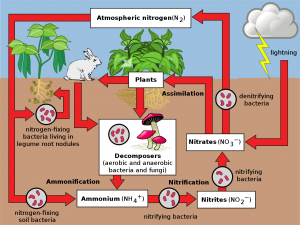   |
NRES 475: Environmental Microbiology
Course Description
Environmental microbiology is a synthesis of many scientific disciplines including bacteriology, mycology, soil science, aquatic ecology, biochemistry, chemistry, plant physiology, and plant pathology. Environmental microbiology is closely linked to soil fertility, water quality, nutrient cycling, ecosystem productivity, and environmental quality. Without microorganisms, our soils would soon disappear beneath layers of litter, lakes would fill with dead plants and animals, productivity in natural and agricultural ecosystems would eventually cease, and natural and synthetic chemicals would accumulate to toxic levels in the environment.
This course is intended for both undergraduate and graduate students. The course introduces students to the microbial community in terrestrial and aquatic environments and covers the metabolic and molecular diversity of microbial populations and their role in ecosystem processes. We will learn how these processes sustain natural and managed habitats and contribute to environmental quality. Techniques for characterizing environmental microorganisms and investigating microbially-mediated biogeochemical transformations will also be discussed.
Main Learning Objectives
– Microbial habitats – describe the important factors controlling microbial populations and their activities
– General knowledge of organisms in the environment – Describe major categories, compare and contrast physiology, relative abundances in various habitats
– Understand how environmental microorganisms make a living
– Knowledge of interactions among microbes
– Biogeochemistry – understand the microbial ecology behind nutrient cycles
– Understand environmental problems and solutions involving microbial processes
Instructor
Professor Angela Kent
306 ERML
akent@illinois.edu |
 |
NRES 102: Introduction to Natural Resources and Environmental Sciences
Course Description
The goal of this class is to gain an understanding of basic environmental science principles, including an introduction into the structure and functioning of ecosystems (e.g., nutrient cycling, energy and mass transfers between trophic levels, etc.), and the relevance of these principles with respect to understanding and addressing pressing global environmental issues. Emphasis will be given to quantifying current understanding regarding the “state of the planet” and to exploring management strategies to address global concerns. Course grading philosophy is based on personal effort and progress, if you are consistent in attending and participating in class, and submitting assignments on time, you will do well in this course.
Main Learning Objectives
– Increase understanding of the science and implications underlying global environmental issues including population growth, food supplies, fossil fuels, “green” energy, biodiversity, ozone depletion, global climate change, and water quality and pollution.
– Foster the ability to apply scientific reasoning to address environmental issues and enhance critical thinking and written communication skills.
– Develop awareness of how your lifestyle affects the environment, identify environmentally conscious lifestyle changes.
– Develop awareness of the moral dimensions that underlie environmental management decisions, and how these implicitly impact choices.
Instructor
Professor Angela Kent
306 ERML
akent@illinois.edu |




